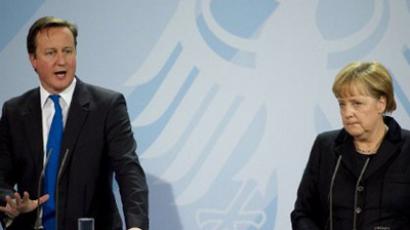Did Germany approve bailout to force Greece out of eurozone?
Germany’s parliament has approved a vital €130 billion bailout package for Greece. But political analyst William Engdahl believes this is part of Germany’s strategy for getting “the weakest link out of the eurozone.”
“The terms that Germany imposed – insisted on – for Greece’s second bailout of €130 billion were so stringent that it was pre-planned to force Greece out,” Engdahl told RT. “Some time later in the year, perhaps as early as June or July, maybe later in the autumn, it is expected that Greece is going to leave the eurozone.”The parliament approved the bailout with 496 votes in favor, 90 against and five abstentions. The decision gives a green light to Greece’s second rescue package in less than two years. However, it is not clear what share of the new package Germany will have to pay from its own pocket. It is expected that the IMF will also make a significant contribution.The idea of bailing out Greece has never been popular in Germany. Before the vote, Chancellor Angela Merkel told lawmakers that although no one could give a 100 per cent guarantee that the rescue program will indeed help Greece, it would be "irresponsible" to abandon the country to bankruptcy at this point.Engdahl says that Merkel is riding high in the German popularity charts precisely because she has portrayed her government as being “tough as nails” on the Greeks, punishing them for their past excesses. “This is the last throw of the dice, if you will. I don’t think there’s going to be any more money after this,” he said. “After this last round, I think, the Greek exit from the eurozone is preordained.”Engdahl believes it is “absurd” to imagine that Greece is going to stay in the eurozone. “The loss of Greece to the eurozone at this point will not be a dramatic event for financial markets, because it has already been largely pre-discounted,” he said. “In the end that will leave the remaining eurozone countries somewhat more stable than they are right now with Greece in.”For Greece, on the contrary, staying in the eurozone would lead to a disaster, as there is no way that Greece can sustain the conditions that the IMF and EU have imposed for passing the additional rescue package, Engdahl said.“The austerity cuts on government workers, the lay-offs, the cuts of pensions are lowering of the economic growth rate,” he said. “It is now minus seven per cent in 2011. These terms will bring it down to double-digit numbers. That’s just not sustainable.”
‘Third bailout will probably be needed for Greece’
Financial writer Peter Bild says that another bailout will prevent a Greek default for the time being, but added that “people are of course talking about the probable need for a third one, and Angela Merkel said she is not guaranteeing anything as a result of this bailout.”
“We hope it is going to work, because the opposition are saying it’s her own policy and lack of leadership that has left Europe in this position, and that almost certainly Europe is going to be back in this position, Germany once again probably voting for bailout – who knows – in one, two, three years time.”
Bild notes that many do not deny that Greece should not have been invited to adopt the euro when it did “because it certainly did not meet the criteria” and that some believe that “probably Greece would be better out of the euro.”
The analyst also spoke on the risk for the eurozone in the event of that scenario.
“Nobody really knows exactly how much bad debt is actually on the books of the banks; whether they would be able to effectively get the insurance that would result from the default – nobody knows how much this could involve. It would certainly be billions – who knows, maybe even trillions – by the time you add up all of the links that the banks have with each other around the world. That is a great fear.”














